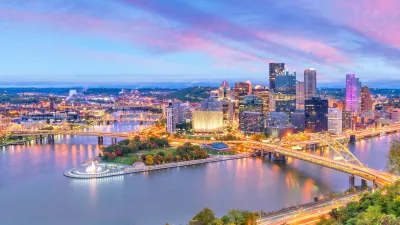Some communities are turning abandoned campuses into offices, art studios, and housing.

First, it was office buildings and malls. Now, schools are getting into the adaptive reuse game as some shuttered campuses are getting new lives as artist studios, restaurants, housing, and community spaces.
Writing in Smart Cities Dive, Amanda Loudin points to the example of the Bok Building, a former South Philadelphia high school now home to over 200 businesses and nonprofits. “The businesses in the Bok Building employ more than 600 people, 75% of whom live within a mile-and-a-half radius of the site, said Lindsey Scannapieco, managing partner of Scout, the development and design firm behind Bok’s revamping.”
With 755 schools closed in just the 2021-2022 season, these buildings offer a valuable new source of commercial and residential space. However, “A lack of funding and community pushback are some of the hurdles that face school-repurposing projects.” Successful projects have often relied on some combination of private financing to fund renovations.
FULL STORY: Adaptive reuse breathes new life into abandoned schools

Montreal Mall to Become 6,000 Housing Units
Place Versailles will be transformed into a mixed-use complex over the next 25 years.

Planetizen Federal Action Tracker
A weekly monitor of how Trump’s orders and actions are impacting planners and planning in America.

DARTSpace Platform Streamlines Dallas TOD Application Process
The Dallas transit agency hopes a shorter permitting timeline will boost transit-oriented development around rail stations.

Without International Immigrants, the Rural US Population Would Be Falling 58%
Census data shows that population growth in rural areas is due in large part to international migrants.

Dead End: Nine Highways Ready for Retirement
The Freeways Without Futures report describes the nation’s most promising highway removal proposals.

Congressman Proposes Bill to Rename DC Metro “Trump Train”
The Make Autorail Great Again Act would withhold federal funding to the system until the Washington Metropolitan Area Transit Authority (WMATA), rebrands as the Washington Metropolitan Authority for Greater Access (WMAGA).
Urban Design for Planners 1: Software Tools
This six-course series explores essential urban design concepts using open source software and equips planners with the tools they need to participate fully in the urban design process.
Planning for Universal Design
Learn the tools for implementing Universal Design in planning regulations.
City of Mt Shasta
City of Camden Redevelopment Agency
City of Astoria
Transportation Research & Education Center (TREC) at Portland State University
City of Camden Redevelopment Agency
Municipality of Princeton (NJ)
Regional Transportation Commission of Southern Nevada





























